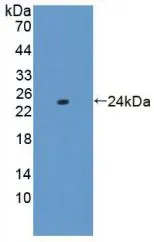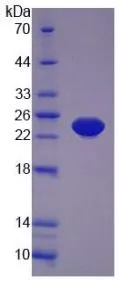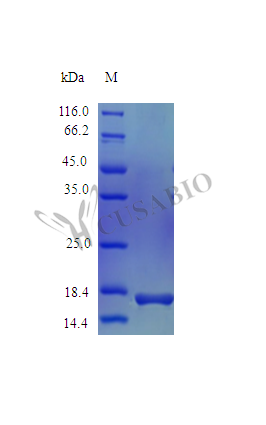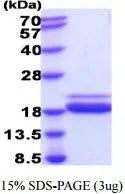
Cell necrosis effect of GTX00288-pro Mouse TNF alpha protein (active). (A) Unstimulated A549 cells cultured in DMEM for 72hrs. (B) A549 cells cultured in DMEM, stimulated with 10 ng/ml TNF alpha for 72hrs.
Mouse TNF alpha protein, His tag (active)
GTX00288-PRO
ApplicationsFunctional Assay
Product group Proteins / Signaling Molecules
Protein IDP06804
Overview
- SupplierGeneTex
- Product NameMouse TNF alpha protein, His tag (active)
- Delivery Days Customer9
- Application Supplier NoteTNF-a (Tumor necrosis factor), being an endogenous pyrogen, is able to induce fever, necrosis, inflammation and to inhibit tumorigenesis. As reported, TNF-a could inhibit the proliferation and induce necrosis of A549 cells, and the concentration of IL-1beta in cell supernatant will increase after stimulation. Therefore, A549 cells were incubated in DMEM with TNFa (1 ng/ml, 10 ng/ml) for 2h, 4h, 8h, 24h, 48h, then cells were observed by inverted microscope. Cell necrosis after incubation with TNF-a (10 ng/ml) for 72h.
- ApplicationsFunctional Assay
- CertificationResearch Use Only
- ConjugateUnconjugated
- Gene ID21926
- Target nameTnf
- Target descriptiontumor necrosis factor
- Target synonymsDIF, TNF-a, TNF-alpha, TNFSF2, TNFalpha, Tnfa, Tnfsf1a, Tnlg1f, tumor necrosis factor, cachectin, tumor necrosis factor ligand 1f, tumor necrosis factor ligand superfamily member 2, tumor necrosis factor-alpha
- Protein IDP06804
- Protein NameTumor necrosis factor
- Scientific DescriptionThis gene encodes a multifunctional proinflammatory cytokine that belongs to the tumor necrosis factor (TNF) superfamily. Members of this family are classified based on primary sequence, function, and structure. This protein is synthesized as a type-II transmembrane protein and is reported to be cleaved into products that exert distinct biological functions. It plays an important role in the innate immune response as well as regulating homeostasis but is also implicated in diseases of chronic inflammation. In mouse deficiency of this gene is associated with defects in response to bacterial infection, with defects in forming organized follicular dendritic cell networks and germinal centers, and with a lack of primary B cell follicles. Alternative splicing results in multiple transcript variants. [provided by RefSeq, Jun 2013]
- Storage Instruction-20°C or -80°C,2°C to 8°C
- UNSPSC41116120
- SpeciesMouse









